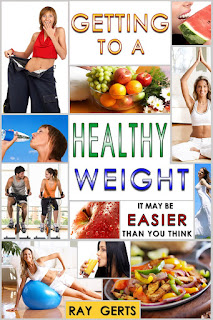You're doing everything right and your diet isn't working. You're not eating a lot, but you're still gaining weight. Is it your fault? Are you doing something wrong? Did you choose the wrong weight loss plan? Are you simply meant to be overweight? The answer to all of those questions is probably no.
No matter what diet you're on, no matter which weight loss expert you follow or workout program you practice, the secret to weight loss success is finding the right energy balance.
You've got to burn more calories than you consume. But it's more complicated than it sounds, because there are many factors that affect both your energy input (calories consumed) and your energy output (calories burned).
Reasons that Your Diet Isn't Working
There are many factors that affect your daily calorie intake. Any of them could be the reason that you can't lose weight. Most likely, the problem is a combination of several factors. Evaluate each of them to see where you can make adjustments.
- Hunger Is your diet starving you. That's not the way to lose your body fat.
- Boredom Many people snack from boredom, especially at night. Healthy snacks are good, but never snack at night. Those calories will go straight to your fat cells.
- Low-fat pitfalls Foods that are high in fat contain more calories. But many times these foods are more satisfying than low-fat foods that are high in sugar. So what's the better choice? You can find low-fat, low-cal foods like non-fat Greek yogurt, but it's still a good idea not to eat at night. Usually I get hungry at night because I didn't eat enough protein during the day. I'll do Yoga at night and the urge will pass and I forget about it.
- Meal frequency Eating more often may help you to avoid binge eating at mealtime, but eating more often also increases your chances to consume too many calories. If you eat 2-3 large meals during the day and snack often because you're hungry, try 4-5 smaller, calorie-controlled meals. On the other hand, if you have a meal every three hours and you're not losing weight, you may be eating too often. I like the 5 meal a day plan, I don't get hungry if I eat every three hours, but you have to control the calories. I try and stay to about 300 calories per meal. You can do an internet search "300 calorie meals" and you'll find dozens of chioces.
- Stress Many of us manage emotions with food. Food provides comfort, often gives us a sense of control and is a source of enjoyment. But those comfort calories add up. If you suspect that emotional eating is derailing your diet, consider healthy alternatives to reduce stress. Take yoga, or any physical exercise you can do for 30 minutes.
- Fatigue What do you do when your body begins to lag in the afternoon? I don't know about you, but I head to the kitchen. It's natural to look for energy (i.e. calories) when you need a quick pick-me-up. The problem is that when your activity level lags, the worse thing you can do is consume more calories. Before you grab your late afternoon snack, ask yourself if you are responding to hunger or fatigue. If you're tired, take a 15-minute nap! If your at work, drink hot tea or coffee.
- Portion size Almost all of us make portion size mistakes all day long. If your diet isn't working think about keeping a food log, record all your food and drinks. Most people are making the same mistakes, They think they consume less calories than they really do.
Food choices When trying to lose body fat, make your calories count. Don't eat empty calories. Most of the time we consume empty calories in our drinks. Stop drinking anything that contains calories and stick to eating foods with high amounts of nutrition.
Workouts that are too hard Believe it or not, but your workout might be the reason that you're not losing weight. Some programs like CrossFit could actually be harmful to your weight loss program if it causes you to take too much time off or worse, causes injury. Try to get some physical activity every day. That means you should schedule easy and moderate workouts along with the high-intensity fat burners.
- Non-exercise activity level. If your fat-burning Tabata workout exhausts you to the point that you spend the rest of the day on the couch, then you are not benefiting from NEAT. Non-exercise activity thermogenesis can account for up to 2000 calories burned per day. Make sure you keep moving all day long. Take the stairs, carry your own groceries, stand while you chat on the phone. It all adds up.
- Stress-induced laziness. Some people react to stress by moving. But others take to the couch in times of trouble. If you are going through a difficult time, give yourself permission to rest. But try to incorporate easy workouts with a friend to gain support and stay active.
- Fatigue. The simple act of dieting can cause stress and fatigue. Even if your weight loss program is not at fault, daily exhaustion is likely to hinder your workouts and your NEAT. Learn how to sleep better for weight loss. Take simple steps like charging your phone in the kitchen or changing the lighting in your bedroom to get a better night's sleep.
- Physical factors. Medical conditions, like thyroid disease, can affect your daily caloric expenditure. Factors such as age and genetics also play a role in the number of calories you burn. Talk to your doctor about factors that affect your metabolism. Sometimes there are things you can do to give it a boost.
- Body composition. Muscle burns more calories than fat. To increase your calorie burn all day, boost your lean muscle mass. Eat enough protein to fuel your weekends and build strong muscle. Then complete regular strength training workouts at home or at the gym to get lean and buff.
- Your job. Occupations that require you to sit at a desk will decrease your daily energy output. You're not likely to change jobs to lose weight, but you may be able to make simple changes in your office to increase your daily caloric burn. Stand while you type, try asking your boss for a stand-up desk, skip the elevator and walk the stairs, turn sit-down meetings into walking meetings. Some companies are even installing treadmill desks to help workers increase their daily activity level and improve health.
- Exercise habits. The way you schedule your workouts can make a difference in the number of calories you burn during each one. For example, if you schedule a long run on a day after a tough boot camp workout, you may be too tired during the run to gain a real benefit. Create a balanced exercise program to burn calories with consistent but reasonable workouts.
- Exercise-induced eating. Believe it or not, one of the most common mistakes that dieters make is eating too much and justifying the episode with exercise. Heavy exercise programs will actually stimulate your appetite. So you justify that big lunch because you did a big workout. Workouts don't burn that many calories. On average a big workout will burn about 300 calories, the same as a small lunch.
Is My Diet Doomed to Fail?
Trying to find the reason your diet isn't working can be painful. But if one of these factors is contributing to your weight loss woes, you need to address it if you want to slim down. Get creative and try different tweaks. Everyone can lose weight, you have to find the right way for you.
If you have loved some weight but stopped losing, you probably have to adjust your calories again. As you lose you require less calories, so every 10 pounds or so that you lose drop the number of calories your eating by 100 and see if that works.
Losing body fat should be your goal. Read up on weight loss and losing body fat. It doesn’t cost money to lose weight. The internet is full of free information.
But the quickest way and cheapest way is to buy an ebook online and get everything you need in one short read. I have two ebooks on Amazon:
How Bad Do You Want To Lose Weight
Getting To A Healthy Weight
Check out one of them, I think you can find all the info you need and plenty of tips on how I lost my body fat.
Look for my e-books at the websites listed below. You'll get information on Healthy eating, exercise, and diet. Instead of spending hours on the internet reading dozens of posts, you can save time by picking up one of my e-books.
Go to any of the websites below and search the title to find these e-books. These books give you all you need to lose weight without spending money on gym memberships, diet plans or meal plans. Look for my books at Amazon.com, barnesandnoble.com,
iBooks, Kobo.com, Scribd.com, or Gardner Books in the U.K.
My new e-book is available on Smashwords.com, just type “getting to a Healthy Weight” in the search box at the top of the home page.







Comments
Losing body fat should be your goal. Read up on weight loss and losing body fat. It doesn’t cost money to lose weight. The internet is full of free information.